#extraverted intuition
Engaging extraverted intuition in a healthy way
I had been looking for ways to improve my Ne and engage my Ne in a healthy manner. But I could not find ways to tackle it in the internet. Therefore I came up with some ideas of my own. Hope it helps.
Ne jumps from one idea to another, one taks to another. Ne can’t engage in one taks for a longer period and doing so will be exhausting. So why not master Ne by doing things in a way that would keep feeding Ne?
ENFP’s find it hard and exhausting to plan and stick to a plan. But in order to get things done, planning is vital.
How about a versatile plan, where you could actually pick and choose what you want to do at a particular time based on your mood?
I came up with this model of planning. Studying
Module 1 (Topic A, subtopic A)
Module 2 (Topic A)
Module 3 (Topic A)
Mandatory stuff
Laundry
Cleaning the cupboard (whatever)
Stuffs to search on google
Topic A
Idea B
Topic B
Reading list
Book A (1 chapter)
Book B (1 chapter)
Article A
Series
Title 1 - episode 1
Title 2 - episode 2
Movies
Title 1 (first half)
Title 2 (first half)
I am pretty sure most of you would have lists like this. But never never pick one task and try to engage in it for long. Jump around different task along the course of the day which will keep you more energised. Completing one task at a go, forcefully engaging in a single task for a longer period, binging books, movies, series will exhaust us and stress us.
Also allow the list open to add new tasks, which is always going to happen anyway, just like, how I am going composing this post right now, while I have 100 other stuffs to do. But having a plan like this will prevent me from lingering in Fb after posting this.
The trick is to be persistent and update the list daily.
Thus keep your Ne engaged and feeding it all the time by having 100s stuff to pick on a daily basis.
By completing small chunks of multiple tasks we will eventually complete all of them without exhausting ourselves.
I have so many thoughts, so many ideas within my head. I love to share my ideas with people and love to be heard.
But, the world is so busy scrolling by and resharing memes. Nobody cares anymore about originality. Nobody really register what they read or come across in their minds because of the constant overflow of information.
People are becoming zombies that scroll and tap. It is depressing when my ideas and thoughts are being disregarded, forgotten and buried. Being unheard is a tragedy in itself!
wss is much better than twfp of course
car salesman entp’s ti performance can not be as good as philosopher entp’s ti performance, let alone janitor entp’s ti performance. believing all these entps share the same exact performance level is ridiculous.
ti is not conditional logic. ti is prefering logic over ethics. ti is also preferring to solve problems by really understanding every element of that problem as opposed to trusting an authority.
quality or speed of ti do not have to be very high in every entp.
ti is doing the reasonable thing, given what you know, ignoring ethics. for example pulling the lever in trolley dilemma, thinking “huh? where’s the dilemma here? kill 1 instead of 2 of course.” but a person who use fi will think “if i pull the lever, i kill that one guy who was not going to die under normal circumstances, i am absolutely responsible for his death therefore.”
it doesn’t matter HOW FAST you reach one of those conclusions.
if ne can come up with super tangential associations, se can come up with directly related associations. synonyms of a word for example has NOTHING to do with ne. NOTHING! because synonyms are DIRECTLY the same thing with the base word.
or, if you give a word like rabbit to se user, he can come up with a word like carrot because it’s directly what rabbit eats. you don’t need INTUITION for that association.
and once again, everybody can automatically say who is your mother’s son. no logic required. therefore, further steps you add to that question only challenges your working memory, not logic.

Mr. Green: Extraverted Intuition (Ne)
(According to the “real” ending, Mr. Green is not who he pretends to be, but let’s go with the character he’s acting as for the majority of the story.)
Mr. Green is nervous and chatty and prone to random conceptual leaps—“Mrs. Peacock was a man?!” He’s had to live his whole life under a pretense, acting out a part that everyone wants to see. He’s the one chosen to distract the cop, making up idle conversation while the others hide the bodies. He connects the dots during dinner conversation that all of them work in the government, and wonders what it could mean. In the real ending, he’s first to arrive at the conclusion that Wadsworth is really Mr. Boddy. He slaps Mrs. Peacock because it seems like a good idea at the time, and he’s kind of awkward in his own body, often falling prey to clumsiness.
Best Suggestion: ENFP

Wadsworth: Introverted Intuition (Ni)
Wadsworth has one goal for the evening—to dispense with his accomplices and tighten the noose on his blackmail victims. For this he invents a whole evening of shadowplay, a complex plan to push his dinner guests toward murder. He assigns each of them colorful names, possibly related to how he visualizes their individual personalities in his imagination. Or maybe as if he’s picturing them as pawns on a gameboard. Though he’s confident of his plot, he can become just as panicked as anyone else when the environment changes too quickly—when the lights go out, he mistakes a shower faucet for a doorknob. He walks, or rather runs, the company through the night’s events, appearing to have solved the crime when actually he already predicted what everyone would do. For all his foresight, he fails to react in the moment when Mr. Green gets the drop on him and ends his crime spree.
Best Suggestion: INFJ
(Not really sure that Wadsworth is actually an Ni-user, but I think this paints a decent portrait of the cognitive function as if he were.)
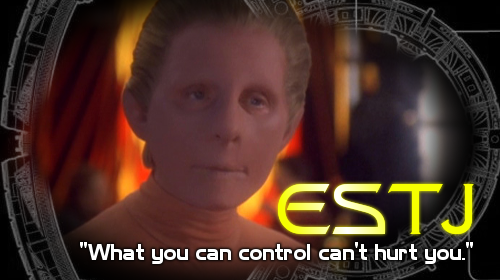
ESTJ – the Director, the Achiever, the Optimizer
When we type a villain, we usually expect their inferior function to be their fatal weakness. For Te-doms, the stereotype is that they have no moral oversight to their actions. By contrast, the intimidating Founder has a very clear moral vision–she believes she is absolutely entitled to wield control over other, lesser species.
Another of DS9’s ESTJ villains, the meddling Brunt, acts the same way. He enforces the laws of Ferengi society with an aggressive sense of justice. Just like a weak inferior-Te user might use faulty logic to defend their subjective beliefs, inferior-Fi can provide the comfort of self-righteousness to an over-controlling ExTJ.
(This character was never given a name on the show. Instead, she was referred to in dialogue and in the credits as simply, “Female Changeling.” That’s super clunky and annoying to type over and over, so for simplicity’s sake, I’m just calling her “The Founder.”)
Dominant Function: (Te) Extraverted Thinking, “The Workshop”
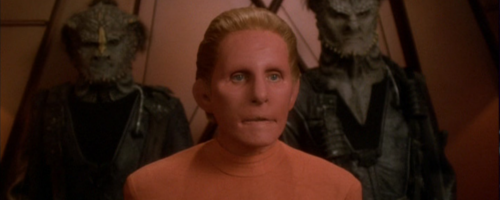
The Founder’s major directive is to bring every civilization she meets under the control of the Dominion. She sees it as her calling to bring order to a galaxy racked with chaos. Solids, she believes, don’t know enough to govern themselves, and so the Founders must lead.
The Founders exert control over their realm through their minions, the loyal Vorta and Jem’Hadar. Both races are genetically engineered to be obedient without question, and to view the Founders as gods. For further control, the Jem’Hadar are engineered to be addicted to a drug called Ketracel-white, which only their “gods” provide.
The Founder is supremely confident and implacable even in the face of setbacks. She always believes the Dominion will succeed, and repeatedly tells her enemies how doomed to failure their efforts are. She’s completely intolerant of failure and incompetence, and grows more demanding with her subordinates as the war drags on.
Auxiliary Function: (Si) Introverted Sensing, “The Study”

Millennia ago, Changelings were hunted down by solids who feared and distrusted them. The survivors formed the Dominion, and began conquering the solids in an effort to ensure that they were never persecuted again. The Founder sees all non-shapeshifters through the lens of this story, and won’t accept them as anything other than dangerous, small-minded brutes.
She finds existence as a humanoid limiting compared to the way she lives when she’s at home in the Great Link. Though she describes the Link to Odo in abstract terms, I don’t think this puts it outside the realm of sensory experience. Si, because it’s personal to the user, can feel abstract and hard to describe, like any other Introverted function.
Odo’s Si-experience is usually of being in one form, while The Founder has been many different shapes and beings over the centuries. She can replicate anything or anyone down to the last tactile detail, and shares the experience of all the other Changelings she’s with in the Link, who have also taken many forms. Thus her life experience is multi-faceted and expansive, and she very naturally feels that she is wiser and has more understanding of the universe than solids trapped in one form. That she refuses to consider their perspective until Odo links with her betrays the hidden rigidity of her thinking.
Tertiary Function: (Ne) Extraverted Intuition, “The Hiking Trails”
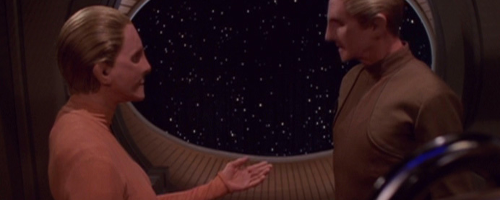
The Founder takes pride in being a shapeshifter, and gets bored and frustrated having to stay in the shape of a humanoid for too long. She pushes Odo to think outside the box (or bucket) of his bipedal existence, to experience the essence of different objects and lifeforms. She uses language that sounds mysterious and abstract to him as she describes life in the Great Link, hinting that she may be not so much an individual, but a “drop” of the Great Link that “becomes the ocean” when she returns.
On the other hand, the Founder’s ideas of humanoids have solidified, if you will, and she will not be moved in her perception. She tries love-making in the humanoid style, and is not impressed. When she’s infected with a wasting disease by Starfleet’s secretive Section 31, this only confirms her cynical view of humans. As her war efforts begin to fail, she begins to loop, ordering the swift execution and re-cloning of her Vorta scientists to provide a fresh perspective on their work to cure her.
Inferior Function: (Fi) Introverted Function, “The Deep Well”
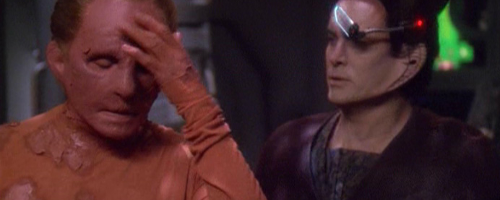
The Founder pursues her mission to dominate the galaxy with an air of moral superiority. She believes that Changelings are a higher life-form than all non-changelings, giving the Founders the right and duty to conquer. She needs allies like the Breen and the Cardassians to build her forces, but she still views them with disdain, and will manipulate them to serve her purposes.
Her greater mission, beyond conquering the Alpha Quadrant, is to bring Odo home. She’s tender and patient with him, repeatedly inviting him to return to the Link. She and the other Founders feel forced to punish Odo for breaking their one rule—that no Changeling ever harms another Changeling—but once his time is served, she once again entreats him to join their ranks. Though he has chosen life with the solids, she assures him that he will always be a Changeling in the eyes of his people.
The Founder grows testy as the infection breaks her down, and the Alpha Quadrant refuses to surrender to her will. She denies her condition at first, not wishing to show weakness, but then she stops caring how anyone sees her. She bullies, criticizes, threatens, and abuses her subordinates. She orders mass executions of Cardassians to punish the insurgent movement, and then orders the whole planet wiped out when it looks like the Dominion has lost.
When at last Odo links with her, sharing the cure for her infection as well as his more tolerant perspective on the solids, the Founder surrenders. She signs a peace treaty to end the war, and voluntarily submits herself to imprisonment for her war crimes. Even so, she keeps her head held high.

ISTJ – the Inspector, the Steward, the Trustee
Eddington undergoes a major character switch when he becomes a villain. After a couple of years serving quietly in the background, he jumps ship (or station, as it were), and goes rogue. He’s more aggressive and dramatic as a crusading Maquis than he was as a law-abiding Starfleet officer, leading me to believe he’s operating out of his lower functions when he makes the change. Eddington sees himself as the hero of his own story, but to Starfleet and Sisko, he’s a terrorist.
Dominant Function: (Si) Introverted Sensing, “The Study”

At first, Eddington seems like a good old-fashioned, reliable Starfleet officer. He joined with the ambition of being a captain, like everyone else, but ended up in security. That department doesn’t typically lead to command, but he still stuck to his job and did it well. Sisko asks him why he doesn’t just transfer over to the command division, but Eddington doesn’t seem interested in a big change at this point.
Of course, that could just be because he has other things brewing.
Eddington eventually reveals himself as a leader in the Maquis, a terrorist group dedicated to protecting Federation colonists left behind in Cardassian territory after new borders are drawn. The Maquis, and Eddington, don’t believe they should have to leave their homes for any reason. Though they’re offered many alternatives, they hold their ground and refuse to leave no matter how poor their living conditions grow.
Eddington appreciates the real, hand-grown, fresh food he raises and eats as a Maquis. He doesn’t like the taste of replicated food, and recognizes the exact menu selection he’s given as a prisoner. His whole existence as a Maquis feels more natural to him than his outward presentation as a Starfleet officer.
On the run from Sisko, Eddington relates their entire cat-and-mouse game to his favorite book, Les Miserables. He’s the persecuted Valjean, and Sisko’s the obsessive Javert. He makes Sisko read the book to understand his perspective—and Sisko plays along, doing all the villainous things Eddington expects of him until Eddington surrenders.
Once the Maquis are wiped out by the Dominion, Eddington feels he has nothing left to lose. He grows nihilistic and cynical and sits around waiting to die. Sisko tests his death-wish, and Eddington comes around long enough to help him out on one last mission.
He keeps a family heirloom, a two-hundred-year-old “Lucky Loonie” coin from Canada, as a good luck token, though he seems to have left it behind when he defected.
His last word when he goes out in a blaze of glory is the name of his wife.
Auxiliary Function: (Te) Extraverted Thinking, “The Workshop”

Eddington is originally assigned to DS9 to provide greater Starfleet control and influence over security operations. This means getting in Odo’s way a lot, although he means no hard feelings about it—it’s just his job. He has the same attitude when he sabotages the Defiant under orders from a Starfleet admiral. He’s just doing his duty, stopping the Defiant from carrying out a mission they were ordered not to do, and he’s very careful not to cripple the ship entirely. Once O’Brien fixes the sabotage, Eddington actually continues serving on the bridge, dutifully fulfilling his function.
Eddington self-sacrificially performs his service as an officer, which probably leads to his discontent over the years. He promises to Sisko that he’s willing to escort a high-ranking ambassador off the bridge against his will if his duty calls for it. He stays behind in the Defiant’s Engineering to help Jadzia prevent a warp core breach even though he’s badly burned—in fact he’s the last officer to leave the scene after the problem is fixed.
Despite his apparent low-key nature, Eddington admits upon Sisko’s promotion that he is a man obsessed with rank and title. When he defects, he in effect gets his own promotion, going from humble security officer to a sort of general in the Maquis, a man respected and followed by many. He feels personally responsible for not being there to lead his people when they’re attacked by the Dominion.
Eddington engineers a masterful heist when he defects, making off with a shipment of industrial replicators for the Maquis, while diverting suspicion, and the crew, to Kasidy Yates.
Tertiary Function: (Fi) Introverted Feeling, “The Deep Well”

Even Sisko admits once he’s gone, that although Eddington was a traitor to Starfleet, he was loyal to what he believed in. Eddington sees the Maquis’ cause as noble and pure, and anyone who opposes it as on the wrong side of the fight. He feels no guilt for the civilian ships or populations they destroy, as he has a very similar stance to Kira’s “all Cardassians (or Starfleet officers) are guilty” speech.
In his Starfleet life, Eddington pretends to have no strong conviction about the Maquis. Just before he springs his trap, he still claims to be solely devoted to his Starfleet duty, only chasing down Maquis because that’s his assignment. Everyone believes him because that’s just the kind of guy he is.
Strangely, Eddington introduces himself when he first arrives on the station as “here to make friends.” Not a typical Fi-user statement, but he really does seem to be a simple, friendly person who wants to do right by his job—and that means being friends with his co-workers. After he defects, he accuses Sisko of being driven by ego, but it’s hard to deny that Eddington seems to have gotten a little worn out with playing nice and normal all the time.
Extraverted Intuition: (Ne) Extraverted Intuition, “The Hiking Trails”

Eddington’s clever and wily, and anticipates every contingency for his heist, planning an escape route and leaving bugs in the computers. He pretends to have no desire to leave prison to help Sisko, waiting until he’s dragged out of jail to go on the mission, just so Sisko won’t suspect that he actually wants to go so he can see his wife again. And he’s plenty creative in his old job too, like when he problem-solves in the moment by beaming the crew into holosuite characters after a transporter accident.
Eddington explains that he was once loyal to the uniform like Sisko, but he began questioning everything he believed after seeing the Federation’s treatment of the Maquis. He dramatically compares the Federation to the Borg, who assimilate others and expect everyone to play along. He aggrandizes his crusade, playing up his own mythos and tragedy, and Sisko calls out his ambitious desire to lead soldiers in glorious, doomed battle.
Eddington gets what he wanted in the end, dying in a flurry of enemy weapons fire while defending his people, fulfilling his fantasy of martyrdom.
(My main theory for Eddington is that he lived dutifully out of the top of his functional stack for most of his life, before the stress of seeing his home abandoned and abused forced him into his lower functions as a response. You could read him just the opposite, I suppose, as a meek Perceiver who was just waiting for the right cause to be a crusader. His Fi seems more strident to me, though, in a way that I’ve seen in other ISTJs who hit upon a sudden moral realization about something late in life.)
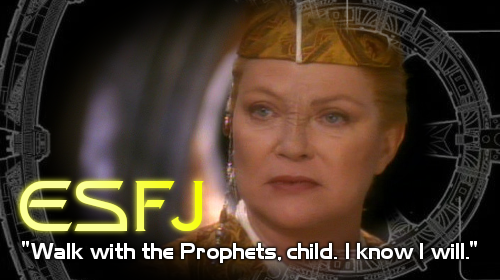
ESFJ – the Provider, the Facilitator, the Caretaker
A smiling, self-righteous old lady enters the place our family of misfit characters calls home and immediately sets everyone on edge with her overbearing rules and conspiratorial grabs for power.
Nope, we’re not profiling Dolores Umbridge today. It’s Star Trek’s own Space Pope, the chillingly wicked Kai Winn. DS9 has some truly lovely Fe-doms on board, but Winn brings the Mean Girl-ness to a religious level.
Dominant Function: (Fe) Extraverted Feeling, “The Garden Fountain”
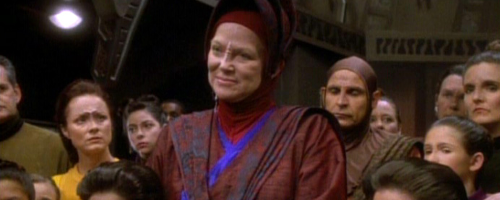
When Winn Adami first saw the wormhole—or the Gates of the Celestial Temple, as her people believe them to be—she felt nothing. All her fellow Bajorans around her, however, reacted in awe, and Winn felt she had to display the proper response. She never has a personal experience with the Prophets her entire life, but rather loops through her Fe-Ne, playing along with the Bajoran faith to pretend that she believes what everyone else believes.
Her rise to power is driven by her need to be seen as more righteous than others despite her insecurities. She finds it deeply distasteful that the Prophets chose an outsider like Sisko as their Emissary. She can’t even get out of his shadow after she ascends to Bajor’s highest religious position. Winn speaks sweetly even to her enemies—perhaps more so—and passive-aggressively insults those she dislikes, always acting shocked when someone (usually Kira) calls out her true motives.
Winn does try to do some good. As a young ranjen, she convinced her superior to take a more active role in fighting the Cardassians, and was able to use gemstones from the tabernacle to bribe Cardassians for small acts of kindness. This saved a precious handful of lives. She confronts Kira for acting like only the members of the Resistance put up any kind of fight during the Occupation.
Winn is outspoken as head of her order, though she’s disappointed that they don’t have as influential a voice as she thinks they should. She sees the Federation and its allies as intruders who will negatively influence Bajoran culture, and leads a boycott against Keiko’s school on charges of blasphemy. The whole show is secretly an assassination plot against Vedek Bareil, her chief rival for the position of Kai, and a more progressive and popular leader than she is.
Whenever someone else threatens to steal her spotlight, Winn’s conspiratorial wheels start churning. She supports the return of the long-lost Akorem Laan as the new Emissary rather than Sisko—that he brings back the traditional caste system doesn’t hurt either. She digs up dirt on Bareil during the election for Kai, which wins her the position, and then makes friends with him when she needs his assistance to negotiate a peace treaty with Cardassia. He’s mortally wounded during the process, and Winn pretends to care about his physical well-being just long enough to complete the talks.
Then she decides he should die with dignity.
Shortly thereafter, Winn wiggles her way into the temporary position of First Minister, a blatant and dangerous combo of church and state. When Kira and former resistance leader Shakaar stand up to her, Winn acts deeply offended. But she quickly offers a statement of support for Shakaar once he’s elected the new First Minister.
Winn briefly begins to come around to Sisko when he discovers the lost Bajoran city of B’Hala. She helps him through his troubling visions, showing true concern and care, and really seems to speak from the heart when confronting Kira about her distrust of her motives and courage. Her diplomatic skills even shine when she negotiates a non-aggression pact between Bajor and the Dominion, assuring the obsequious Weyoun that they are nothing alike, “Nothing at all.”
But Winn’s insecurity gets the best of her, and she returns to her old ways when Sisko tries to unleash the Reckoning. She just can’t live with the idea that Bajor’s fate would be decided by a foreigner, and so she interrupts the process, claiming she did it to save Sisko’s son. Once she starts receiving visions from the Pah-wraiths, Winn tries one more time to redeem herself by confessing her problem—and her pride—to Kira.
Kira recommends that Winn step down, and the Kai feels immediately insulted that she should give up her position after years of faithful service. She resents that the Prophets have never personally spoken to her, and refuses to humble herself to them. Eventually, she gives herself over to the Pah-wraiths, and to a relationship with Dukat, and together they plot the destruction of Bajor.
Traditionally, XNTJs are the ones typed as the villains who want to destroy everything, but when an Fe-dom villain decides that everyone must pay, everyone better watch out.
Auxiliary Function: (Si) Introverted Sensing, “The Study”
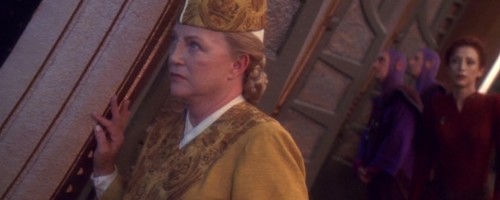
It’s easy to forget that every Bajoran we meet on DS9 only recently came out of a period of great suffering. Winn keeps her condescending composure quite well, but she tells Kira that she remembers “each and every beating” the Cardassians gave her during the Occupation. Though she’s never known the touch of the Prophets, Winn’s resilience in these times seems to serve as the one true touchstone of her faith.
That her endurance is never rewarded by the Prophets angers her deeply. Perhaps she’s looping too hard to appreciate her own personal experiences, reaching for an idealized religious experience that she imagines everyone else has had. When she finally turns on the Prophets, it’s after years of feeling neglected by them.
Till then, Winn holds to the orthodox practices of the Bajoran faith. She doesn’t want non-Bajoran scientific principles taught in the school, and she supports the old caste system during its brief return. She’s distrustful of outsiders and wishes the Prophets had chosen a Bajoran (maybe her?) as their Emissary.
Tertiary Function: (Ne) Extraverted Intuition, “The Hiking Trails”
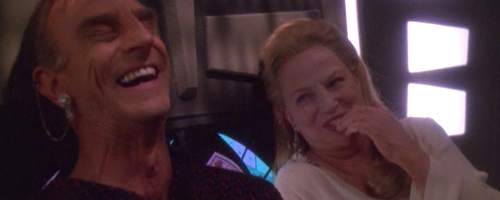
Winn’s a master of pretense, quickly changing allies and stories to go with the flow of public opinion. Her ambition pushes her into greater positions of power, often before she’s had the experience to know what to do once she gets there. Though she’s initially frightened at the thought of leaving the religious establishment she spent her life in—and allying herself with Bajor’s greatest enemy—once she gives up the Prophets for the Pah-wraiths, she feels a delicious freedom she’s never known before.
Inferior Function: (Ti) Introverted Thinking, “The Laboratory”
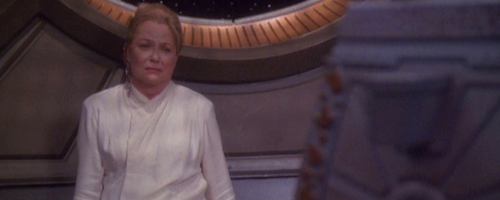
In private moments, Winn will sometimes let down her smiling façade and bite back at those who dare criticize her. She’s anxious and panicky in moments when she realizes her ambition has bitten off more than she can chew, and can’t discern her options. She’s cold and calculating in her grabs for power, and can dismiss the lives she must step on in order to get where she believes she deserves to be. Once her faith fails her, she sees the hard truth of her own hypocrisy, and then blames all her problems on the Prophets and the Bajoran people themselves.
In her final moments, she recognizes her error, and helps Sisko fight Dukat, moments before the Pah-wraiths incinerate her.

INFP – the Healer, the Dreamer, the Clarifier
Keiko O’Brien put up with a lot, and never really got her due. She joined the crewway back in TNG, then left her career to cross over with her husband Miles to DS9, highlighting the show’s themes of family life and diversity. Once the focus shifted to the O’Brien-Bashir bromance (which, to be clear, I think is wonderful), our intrepid botanist went neglected.
Most of her episodes catch Keiko on her bad days, bickering with her husband or worrying what to do with her life. It was tough deciding whether she was always in the grip, or just aggressively using her higher functions. When we see her on good days, she’s obviously smart, sweet, and crazy in love with an Irish engineer who’s as stubborn as she is.
Dominant Function: (Fi) Introverted Feeling, “The Deep Well”

Keiko and Miles love each other deeply in a way that’s obvious to everyone, but also a little inexplicable given how often they seem to be at odds. They clash in the hard-headed way of two Fi-users exasperated with constant compromise. His Fi is lower, so he has trouble working out how to emotionally respond, while her higher Fi wants to be understood without having to explain itself (as an INFP who has dated two ISTJs, I can assure you this never happens in real life…ahem).
Their marriage isn’t easy, but it’s interesting to note that Keiko never brings up the option of separation once she’s committed to Miles. She’s mama-bear protective of her husband and kids on the multiple occasions when various outer space phenomena threaten them, as they do often to Starfleet types. She argues loud for her husband’s innocence when he’s unjustly accused by the Cardassians, and she has a gut feeling that he’s still alive after he’s apparently killed. She has to hold in her feelings when interacting with Miles’ imposter, but the creepiness proves overwhelming, and she makes excuses to get away.
Keiko will stick to what she believes outside of her family life, too. She feels that the kids on DS9 need education, so she starts a school. Vedek Winn tries to shut her down for teaching the scientific explanation about the wormhole without the religious story, but Keiko refuses to budge. She takes in a Cardassian war orphan, and pulls her husband aside during dinner to confront him over his bigoted behavior toward the boy.
They may sound argumentative to those outside the O’Brien household, but Miles declares that Keiko is the most supportive person he knows. When Lwaxana’s telepathic illness causes various members of the crew to randomly fall in love with each other, nothing happens to Keiko and Miles. The others were affected because of latent attractions they held unconsciously, but the O’Briens’ internal compasses point only at each other.
Auxiliary Function: (Ne) Extraverted Intuition, “The Hiking Trails”

Keiko is willing to pick up and move their family to DS9 for the sake of Miles’ career, and after a few weeks of boredom, she finds something productive to do and throws herself into the project. She protests Vedek Winn’s intrusion into her classroom because she sees her job as opening the minds of her students and exposing them to new and diverse ideas. When her unborn child has to be transplanted into Kira after an accident, Keiko just rolls with the new situation, inviting Nerys to live with them during the pregnancy and learning the Bajoran birthing ritual.
When we first meet her, Keiko’s freaking out over her impending marriage to Miles. She backs out, then re-commits, changing her mind virtually every few hours. She knows she loves Miles, but she’s anxious about making the right decision for her life.
This is the frustrating thing with Fi+Ne. Every types’ functions push and pull against each other, particularly when they’re far apart in the stack. It’s how the MBTI model explains the inner contradictions we all have, and helps us to grow. But even our top two functions, the ones that turn us into stereotypes if we only work from them without our lower half, can conflict with each other. Fi, in my INFP experience, is often the most rigid of the functions, while Ne is the most changeable.
Living with these two functions tag-teaming each other at the top of your stack gets exhausting.
On the one hand, you want to stick with the position you know is right, but on the other hand, you’re compelled to always be hunting for unexplored options. So while Keiko looks like a crazy person to her husband, I can completely sympathize with her frustration. She wants to support Miles in his career, but she needs to have her own opportunities to pursue.
Being a stay-at-home mom doesn’t work for her (particularly in an advanced future where there’s not much housework). Being a schoolteacher fulfills her for a while, but then that well dries up. Miles tries to build her a small arboretum where she can work with plants in her spare time, but botany isn’t her hobby—it’s her vocation.
Keiko needs to be a botanist. She joins a Bajoran expedition to explore undocumented species on the planet, and then she’s continuously gone on missions for most of the rest of the series. It’s a constantly moving, always changing lifestyle, and it seems to be the best choice she ever made.
Tertiary Function: (Si) Introverted Sensing, “The Study”

Keiko gets bored with routine. She assures Miles she’s okay sitting in their quarters when he leaves for work, but she needs something to engage her interests and skills. Still, she values her home life, and after months of traveling for work, she feels relief at coming back where she belongs. She keeps many traditions, especially food, from her Japanese heritage, and her wedding to Miles is a tasteful mix of Japanese and Irish customs.
Keiko gets help from a telepath to help her recollect the details from a certain childhood memory. She has various pieces—images, textures, a piece of a song—but she can’t quite recall why it’s important to her. The experience brings her memory into focus, and she finally remembers time spent with her grandmother doing calligraphy.
Keiko believes that footage of her husband’s death has been faked, because it shows him drinking coffee in the afternoon, and Miles never drinks coffee in the afternoon. Her certainty sends Sisko and the crew off on a whole investigation, and sure enough they discover Miles (and Julian) still alive and on the run. When she gets him back, Keiko discovers that she’s mistaken—Miles drinks coffee in the afternoon all the time (cue laugh track, freeze frame, end credits)!
Inferior Function: (Te) Extraverted Thinking, “The Workshop”

Keiko can put her foot down, and often does, leading to stand-offs with her Te-aux husband. She rises to the occasion when she decides the station urgently needs a school, planning and scheduling the curriculum and persuading Sisko to give her the space for it. She even gets Rom on board, convincing him that education will be good for his son.
And let’s not forget she managed to give birth to Molly in the middle of a ship-wide disaster.
(In the not-strictly-canon post-TV novels, Keiko takes a job after the war helping Cardassia regrow its biosphere, and then it’s Miles’ turn to give up his career for his partner. I think it’s a lovely development, bringing the O’Brien family full circle.)
Originally, I didn’t think I would be able to fully type Keiko, and I intended to include her in a quick list of supporting characters. While writing the list, I argued myself into an INFP typing. Back in the TNG series, I ended up typing another troublesome Star Trek character as an INFP, and I’m hoping this doesn’t reveal some sort of bias. I have no deep personal connection to Wesley or Keiko, so I don’t think I’m projecting my own type onto them. If I had to guess, when the show requires a character to act one way this week and another way next week, that Fi-Ne combo seems like an easy explanation.
As always, I welcome input and opinions.
Rosalind Chao certainly deserved better, so catch “The Assignment” from Season 5 to see her absolutely owning the episode.

ISTJ – the Inspector, the Trustee, the Steward
When typing the Vulcans of The Original Series, I observed that most of them are ISTJs. The orderliness, logic, and composure commonly associated with the type just suits them. Turns out our two favorite Klingons are also Si-doms, and Worf and Martok find ways to tear apart their types’ expectations with a fury.
Dominant Function: (Si) Introverted Sensing, “The Study”

Martok has worked long and hard to get where he is. He comes from a lower-class, “commoner” background, and never forgets it. He was the first in his family to apply for officer training, but he was rejected thanks to a negative vote from the legendary Kor, who believed that those without noble blood should not be allowed in the ranks of officers. Martok holds this against Kor for the rest of his life, and refuses to speak to the man when he joins his crew for one last mission.
Martok had to work as a common day laborer due to his rejection, but he never gave up his original plan to become an officer. He served as an orderly on a Klingon warship and finally earned a field commission from his General when they fought invading Romulans. Sadly, Martok’s father had died by the time he accomplished this, and Martok carried that sore spot with him as well, nursing his grudge against Kor.
Over the years, Martok became an experienced and skilled strategist. He rose through the ranks and attained the position of right-hand man to the Chancellor himself, Gowron. He was briefly replaced by a Changeling, and spent at least a year in a Dominion internment camp.
During this imprisonment, Martok loses an eye in one of his daily sparring matches with the Jem’Hadar. He also loses his edge, and worries that he’ll never set foot on a Klingon ship again. Once he’s free, he feels that his captivity has dulled his senses.
It takes a while for Martok to get his footing and his old instincts back. He decides not to replace his missing eye, keeping the scar as a badge of honor, to remember what the Jem’Hadar did to him. He also keeps his fear—very un-Klingon of him—believing that due to his past experiences, only he truly understands and appreciates the danger that the Jem’Hadar represent.
He takes command of an old Bird-of-Prey called the Rotarran, whose crew is beat up and defeated, and can’t shake off his own malaise. He’s looping a bit, afraid of facing his fears by encountering the Jem’Hadar again. It takes a butt-kicking from Worf and a few successful battles under his belt for Martok to feel like his old warrior self again.
Even as Martok gains status in the Klingon Defense Force during the war, he keeps the Rotarran as his flagship based on the memorable victories he won with it and its crew.
At the end of the war, Worf deposes the reckless Gowron and installs Martok as the new Chancellor, based on his years of experience and service. Martok balks at taking the mantle, as he’s never forgotten the humble roots he came from. He’s a common Klingon warrior. To Worf, that makes him the perfect leader.
Auxiliary Function: (Te) Extraverted Thinking, “The Workshop”

When Martok first takes command of the Rotarran, he’s looping, and out of touch with his Te. He uses it ineffectively and bluntly, much like someone in an inferior Te-grip, demanding compliance with unclear orders, bullying and berating his crew, and threatening them with charges of treason if they question him. He’s deeply disappointed at the poor service record of the ship and crew, as they have grown incapable and defeated after months of losing battles.
Worf challenges Martok’s command competency, and the two of them duel on the bridge. Worf almost bests him, but he sees the fire return in Martok, and he lets him win. Now Martok feels like a commander again, and he pulls the crew together for a victorious fight.
Martok’s still a strict disciplinarian, though. He throws a subordinate off the upper level of the Promenade just to teach him a lesson, and almost gets locked up in the station’s brig for it. Worf argues to Odo and Sisko that the General is perfectly within keeping of Klingon disciplinary structures, and they let him off with a warning.
When Nog stands up to Martok and his unruly men, Martok marvels in the little Ferengi’s show of confidence, and gives him respect—and space—from thereon.
While still a traditional Klingon, Martok isn’t as caught up in the formality of ritual like the ISFJ Worf. They’re both Si-dom, but with different Extraverted Judging functions in the auxiliary position. Martok lets Worf go through the motions of the chants and songs as the Rotarran launches, but he really just wants to get on with the job.
Once Martok becomes the liaison between the Klingon forces and Starfleet on DS9, he finds to his dismay that his job involves a lot of paperwork. How’s that for a non-stereotypical ISTJ? Martok prefers direct action, not busywork behind a desk.
When they make it to Cardassia in the final push against the Dominion, Martok’s Starfleet and Romulan comrades stand dismayed at the destruction. Martok, however, wishes to celebrate the victory with bloodwine. This is satisfaction for a job well done.
Tertiary Function: (Fi) Introverted Feeling, “The Deep Well”

Martok discovers a special bond with Worf during their imprisonment. It’s a moment Worf describes as tova’dok, a kind of spark of understanding between warriors. Martok coaches Worf to keep fighting during their imprisonment, and later appoints him his first officer on the Rotarran based on the trust they’ve built.
Eventually, Martok adopts Worf into his house, letting him take the name of Martok and regain his social standing in the Empire.
Martok has a fiery relationship with his wife Sirella, a majestic, formidable ESTJ. No one can quite understand how they work, not even Martok himself. He only knows that as tough a warrior as he tries to be, his honor leaves him lonely without someone to share his victories with.
Martok won’t let go of his grudge against Kor, and initially refuses to explain his emotional reaction to the Dahar Master’s presence on his ship. It is a matter of personal honor (whereas Worf, the Fe-user, is typically concerned with the honor that others will see). Even seeing Kor lose his honor as his mind deteriorates doesn’t satisfy him. After Kor goes out in a blaze of glory, Martok salutes his victory, but will not sing along with the other warriors in his honor.
Inferior Function: (Ne) Extraverted Intuition, “The Hiking Trails”

As a young warrior, Martok hoped for a better position in life than what he was born into, and fought to attain the rank of officer, which by all past tradition should have been out of his reach.
When he returns to command after his imprisonment, Martok has developed fearful and paranoid anxieties about the enemy he faces. Overcautious, he repeatedly orders the ship away from possible confrontation, citing various negative outcomes if they try to engage the Jem’Hadar. He grows pessimistic about the possibility of success, deciding without evidence that there can be no survivors on the ship they’ve come to find. He’s distrustful of his crew, and most of all himself.
To be a warrior again, he has to embrace the unknown possibilities of striking out into battle. Afterwards, he offers Worf a new beginning by becoming his brother.
When he’s being tended to by Doctor Bashir for battle training injuries, he gets fed up with Bashir’s worry. An inch or two this way or that, and Martok could have lost another eye or severed an artery. The old Klingon grumbles: “The human fascination with what might have been grows tiresome. The artery is not severed, and I am not dead.”
Martok is very much alive, despite everything, at the end of the saga. In fact, he’s wearing the robes of Chancellor of the Klingon Empire. It was not an outcome he expected, but it is a chance for the Empire to renew itself after generations of corruption.
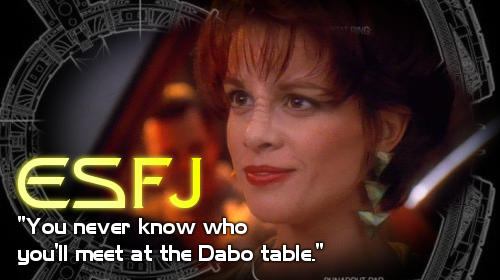
ESFJ – the Provider, the Facilitator, the Caretaker
Like Kira, Leeta’s a young Bajoran woman who survived the Occupation. While one of them picked up a gun, though, the other picked up some Dabo skills. Kira’s Fi-dom makes her edgy and angry, while Leeta moves through the world with an Fe-dom’s openness and generosity, making her living as the life of the party in the hub of DS9’s communal bazaar.
They both fall for some pretty weird Introverted dudes, though.
Dominant Function: (Fe) Extraverted Feeling, “The Garden Fountain”
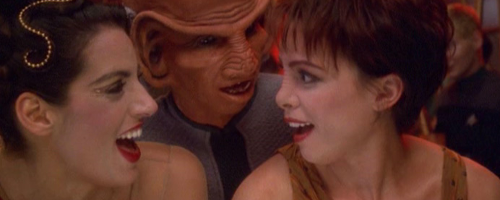
Like her ESFJ boss, Leeta’s gift is hospitality. She entertains guests every day at Quark’s Bar, coaxing their energy up to keep the room lively. Her job is to make sure everyone is happy, enthusiastic, and spending money. She’s something of an amateur sociologist, which comes in handy considering all the diverse people she meets in her line of work.
Leeta’s a very skilled people-person, and quick to make friends. She’s barely known Jadzia for more than a few weeks (like, one episode) before Dax invites her to participate in the very intimate ceremony of sharing a consciousness with one of her past hosts. She coyly flirts with Julian, feigning illness to get his attention; and when it’s time to break up, she finds an amicable way to do it that ensures no hard feelings.
Leeta’s a good judge of character, and sees potential and lovability in Rom long before he does. When he starts a labor union, she helps get the bar employees on board, and encourages Rom in his cause. She waits for him to make the move when it comes to romance, which means she has to wait quite a while. When they have an argument that almost cancels their wedding, she has to vent to her friend Kira, an Fi-dom who patiently listens and then bluntly tells her she doesn’t really mean the angry things she’s saying.
Leeta leaves the station just before the Dominion invasion, accepting Rom’s wishes to keep her out of harm’s way. Before long she’s back, working the Dabo table while secretly joining Kira’s resistance. Now she’s the one fearing for Rom’s safety, as he’s been captured for his sabotage—but Rom doesn’t want to be rescued.
Leeta and Quark, anxious ESFJs that they are, can’t accept this, and they argue with Rom about how stupid he is for refusing their help. Leeta experiences a similar barrier when Nog returns from his surgery after losing his leg. Ezri has to hold back Leeta, now Nog’s step-mother, from comforting her traumatized step-son until he’s ready. When he is, Leeta joins in the family hug to welcome him back.
Auxiliary Function: (Si) Introverted Sensing, “The Study”

Leeta appreciates her Bajoran heritage, introducing Julian to the Rite of Separation when their relationship ends. She wants a traditional Bajoran wedding, and resists Rom’s efforts to get her into something more scanty for the ceremony. In her day job, though, she’s very comfortable in her own skin, and always looks great. She’s so comfortable, in fact, that she answers the door of her quarters without realizing she’s lost her towel.
(And a bit of non-canon info from the post-TV novels, because I think it’s cool: Leeta’s full name was never given because she was orphaned during the Occupation and never knew her family. Once she married a Ferengi, whose people have no family names, it didn’t matter anymore. She stuck quite happily with her single, unique name.)
Tertiary Function: (Ne) Extraverted Intuition, “The Hiking Trails”
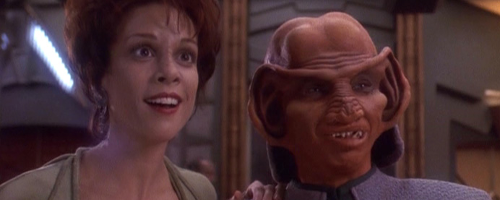
Like any Bajoran who had to survive the Occupation, Leeta can be flexible and adaptable. After a few years of working at Quark’s Bar, she experiences anxiety over the lack of direction in her life, feeling like she should do more, and accepts a position at a distant starbase running their café. When Rom confesses his love to her, she changes course again, starting a new life as part of a Ferengi family. She sees the potential of Rom’s labor union, and demands more and better pay from Quark.
Inferior Function: (Ti) Introverted Thinking, “The Laboratory”
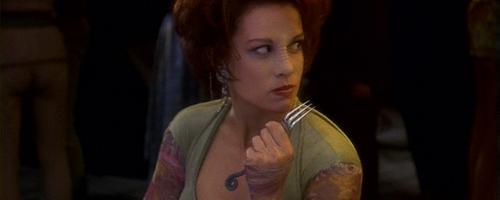
When she puts her mind to it, Leeta can be quite formidable. She studies up on the Trill zhian’tara ritual, and helps Jadzia explain it to the group. She’s insulted that Quark thinks she has no brains, appreciating her only for her physical assets, but she puts up a fight more than once when she figures out she can argue for better working conditions.
When she and Rom reach an impasse about signing a pre-nuptial agreement, she breaks off the engagement and complains to Kira about him. She’s trying very hard to convince herself she doesn’t like him, picking at any fault she can think of. But Kira knows she doesn’t mean it, and they eventually work out the problem.
Love between a Bajoran and a Ferengi is an inscrutable thing, but Leeta doesn’t have to think twice about it.
